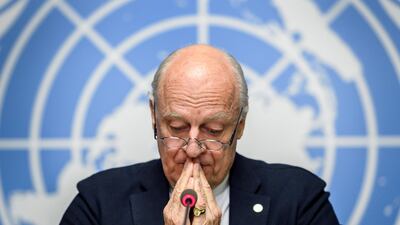The UN Security Council has again demanded a ceasefire throughout Syria and backed a UN-endorsed roadmap for a peaceful transition and elections in the conflict-torn country.
The council reaffirmed in a statement following a briefing on Friday by the UN envoy for Syria, Staffan de Mistura, in which he said that UN-led talks in Geneva "remain the central process to find a political solution."
Council members reiterated their "full support" for Mr de Mistura's mandate to establish a committee to draft a new constitution for Syria "without delay".
The council also joined Mr de Mistura in condemning the perpetrators of violence in Damascus and the rebel-held suburbs of eastern Ghouta in violation of the February 24 ceasefire resolution.
Syrian troops have been on the offensive in the area for four weeks, a campaign that has killed around 1,300 civilians.
The Syrian army says the armed forces have captured and cleared dozens of villages, towns and farms east of the capital Damascus consisting of about 70 percent of eastern Ghouta.
On Friday, Russian and Syrian planes dropped cluster bombs and incendiary weapons on the town in Kafr Batna in Eastern Ghouta, killing at least 46 people, a monitoring group said, as thousands more civilians fled the rebel-held region.
The Syrian Observatory for Human Rights said the town was hit with cluster munitions, napalm-like incendiary weapons, as well as conventional explosives.
_______________
Read more:
Cluster and incendiary bombs kill dozens in Eastern Ghouta town
Seven years of war. A tragedy for Syria. A catastrophe for the world
More than half a million killed in Syria's war
_______________
The UN estimates there were about 400,000 people living in eastern Ghouta, which has been under government siege since 2013 and was controlled by a number of rebel groups fighting to remove Syrian President Bashar Al Assad from power.
According to Syria's UN ambassador, Bashar Ja'afari, more than 40,000 civilians left eastern Ghouta in a single day through a new security corridor opened by the government in the city of Hamouria.
Mr de Mistura said that despite a six-day ceasefire holding in the city of Douma, violence has escalated elsewhere in eastern Ghouta and across many other parts of Syria "where there is no ceasefire to speak of".
Borrowing Secretary-General Antonio Guterres' words, he reiterated that in eastern Ghouta "people are still living in a hell on earth".
He added that there are "fresh allegations of use of incendiary weapons against civilians in urban areas as well as fresh and disturbing allegations of chlorine use in these areas".
He said the UN cannot confirm the reports "but we cannot and should not ignore them".
Mr De Mistura urged faster movement "with more impact" to implement the council's demand for a cease-fire throughout Syria and to establish a committee to draft a new constitution for Syria, saying the Syrian government must engage and be part of the process.
"De-escalation needs to replace what we are watching at the moment — a clear tendency for escalation," he said.
He also said Turkish government forces and their allies "continue to take ground rapidly" in the Kurdish enclave of Afrin, and that there are reports of shelling on opposition-besieged Foua and Kefrya, airstrikes in Idlib and a new opposition offensive in Hama, as well as clashes and airstrikes in Daraa in southern Syria.
Mr Guterres urged the often divided Security Council "to stand united and take concrete steps to urgently end this tragedy". In a statement on Friday, he called for swift action to protect civilians, prevent further instability across Syria and forge "a durable political solution" to the seven-year conflict.

